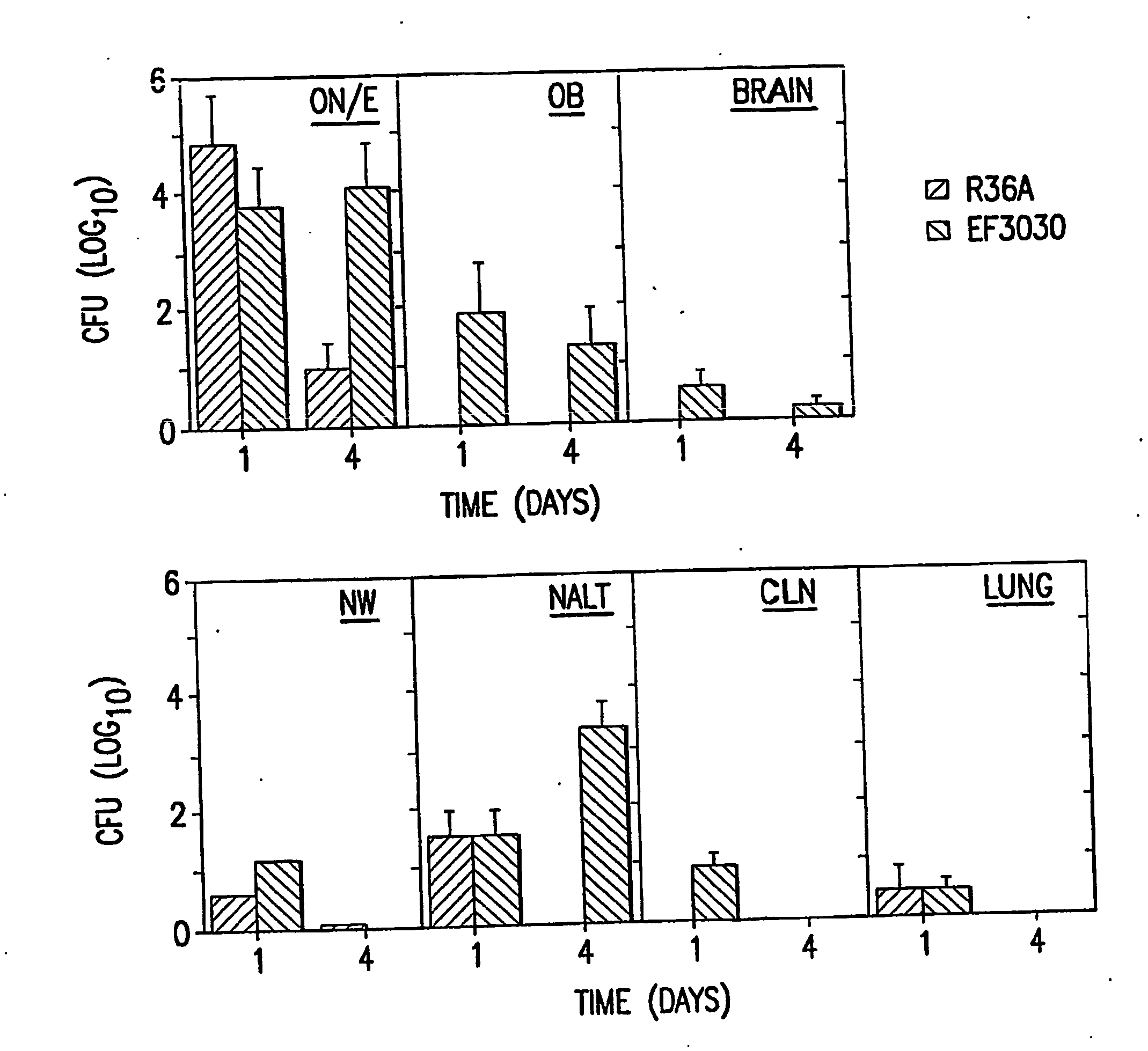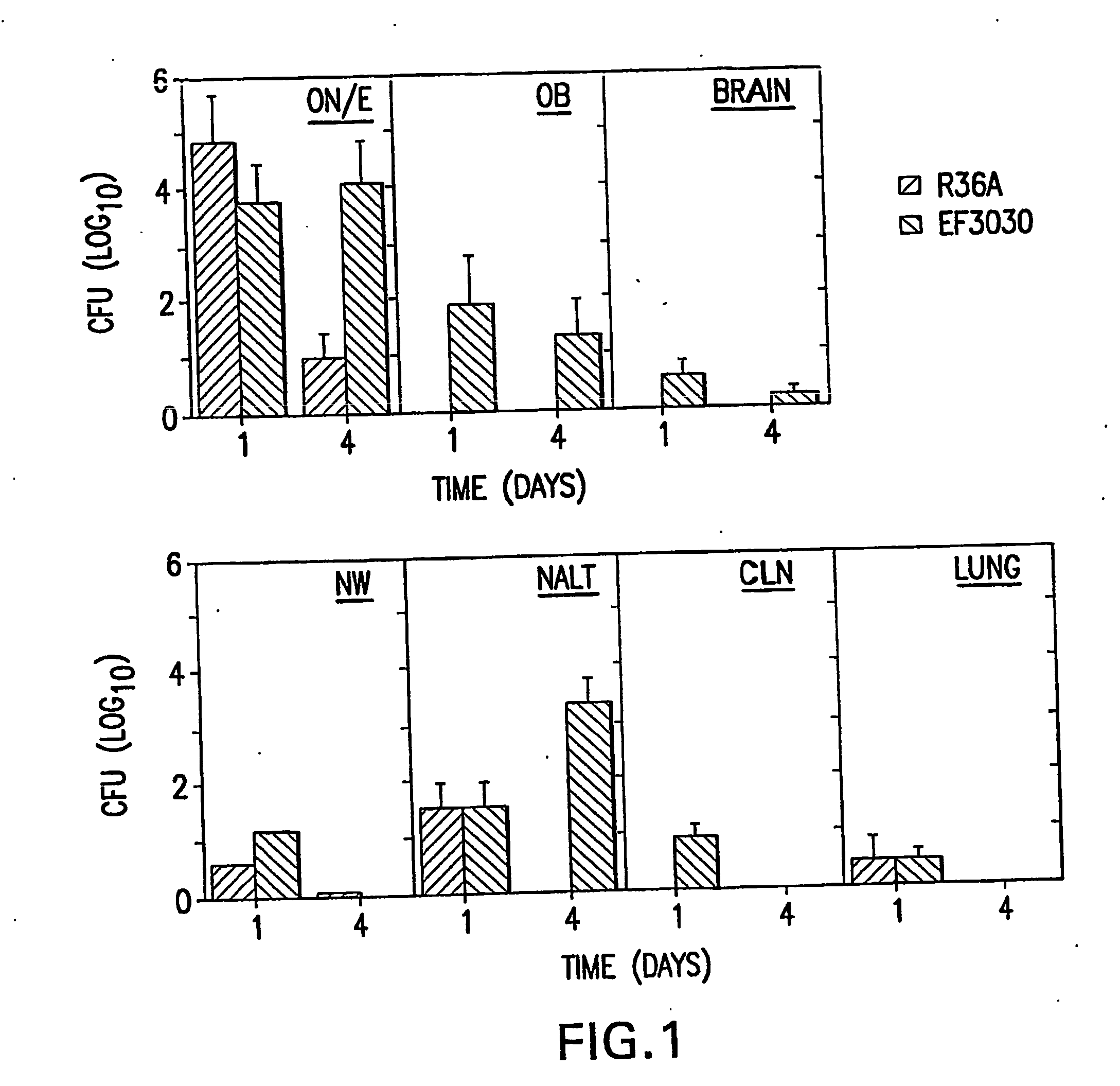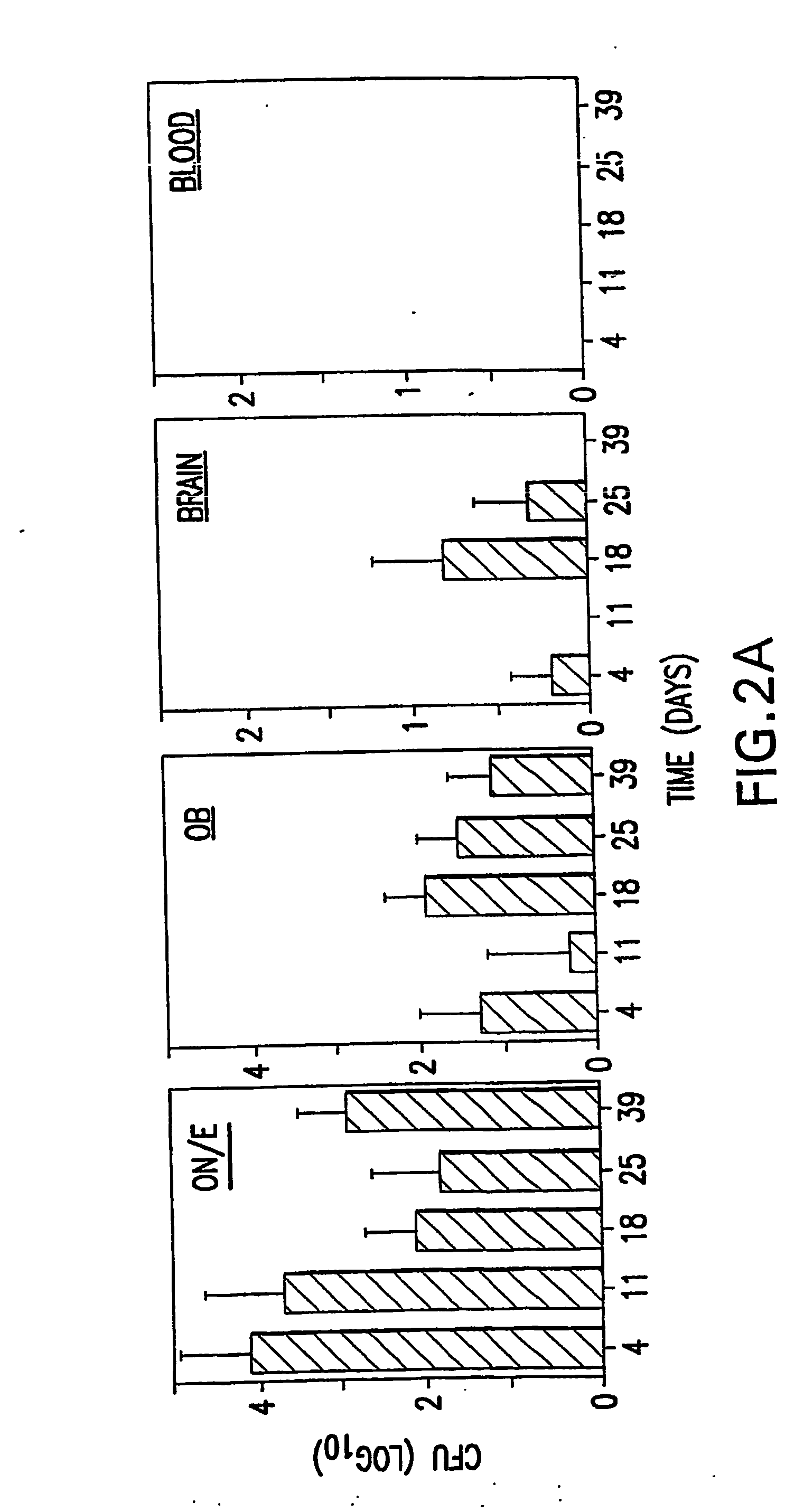Compositions For Reducing Bacterial Carriage And Cnc Invasion And Methods Of Using Same
a technology of bacterial carriage and cnc invasion, which is applied in the direction of antibacterial agents, peptide/protein ingredients, antibacterial medical ingredients, etc., can solve the problems of significant mortality and morbidity, reduce the risk of infection, and reduce the level of free sialic acid in the cerebrospinal fluid (csf). to achieve the effect of reducing or preventing bacterial infections
- Summary
- Abstract
- Description
- Claims
- Application Information
AI Technical Summary
Benefits of technology
Problems solved by technology
Method used
Image
Examples
example 1
Nasal Pneumococci Penetrate Olfactory Tissues During Carriage
Materials and Methods
Pneumococcal Strains
[0091] The studies employed two encapsulated strains of S. pneumoniae EF3030, serotype 19F, and TIGR4 strain, serotype 4 and the avirulent, non-capsular strain R36A derived from the parent strain D39, serotype 2. Avery et al., (1944) J. Exp. Med. 79: 137-158. The EF3030 strain was chosen since it readily colonizes the respiratory tract in the absence of bacteremia (Briles et al., (1992) Infect. Immun. 60: 111-116) and is incapable of sustained bacteremia following intravenous inoculation. The TIGR4 strain was more virulent, but with a modest nasal inoculum colonizes without bacteremia
Mice
[0092] The CBA / CAHN / xid (xid) mouse strain was obtained from the Jackson Laboratory (Bar Harbor, Me.). The mutation in the Bruton's tyrosine kinase gene of these mice results in an inability to respond to thymus-independent type II antigens (Amsbaugh et al., (1972) J. Exp. Med. 136: 931-949...
example 2
The Role of Pneumococcal-NanA in Nasopharyngeal Carriage and Targeting of the CNS
[0107] NanA mutants were generated in three strains of S. pneumoniae differing both in genetic background and localization of NanA. Strains EF3030 (type 19F) and D39 (type 2) both express a NanA that is covalently attached to the cell wall whereas the TIGR4 strain (type 4) expresses a truncated NanA that is secreted into the environment.
[0108] The role of NanB in colonization was also assessed.
Bacterial Strains and Growth Conditions.
[0109] Strains used in this study are listed in Table 4.
TABLE 4Strains, plasmids, andprimersgenotypes or primer sequencesTOP 10F′E. coli strainsstrainsTIGR4capsular serotype 4*EF3030capsular serotype 19F†D39capsular serotype 2‡JPC001D39 / NanA- (insertion duplication)§JW001TIGR4 / nanA- (insertion-duplication mutant)JW002TIGR4: nanA deletionJW003TIGR4 nanB- (insertion-duplication mutant)JW004TIGR4 nanAB- (insertion-duplication double mutant)SAM001EF3030 nanA- (insertion-...
example 3
The Role of Gangliosides in S. pneumoniae Pathogenesis
[0127] Purified neuraminidase, NanA (Calbiochem), is administered at 1, 10 and 50 μg in 10 μl PBS nasally 15, 30 and 60 minutes prior to isolating the ON / E. The tissues are fixed in 4% paraformaldehyde, and paraffin sections made. GM1 is stained for using biotinylated-CT-B followed by Streptavidin-FITC and the intensity of staining is analyzed. The section is also stained by asialo-GM1-specific Abs conjugated to rodamine to confirm a decrease of GM1 staining coincident with increase of asialo-GM1 staining in these tissues. Parallel groups of mice undergoing the same treatment are analyzed for colonization by S. pneumoniae strain TIGR4 and EF3030 at days 1 and 4, to assure that neuraminidase treatment resulted in elevated levels of nasal colonization. Mice are given a high dose of strain EF3030 (1×108 CFU) nasally and the ON / E is isolated at the following intervals: 1, 3, 6, and 12 hrs, 1 and 4 days after nasal challenge. The ON / ...
PUM
| Property | Measurement | Unit |
|---|---|---|
| Fraction | aaaaa | aaaaa |
| Fraction | aaaaa | aaaaa |
| Fraction | aaaaa | aaaaa |
Abstract
Description
Claims
Application Information
 Login to View More
Login to View More - R&D
- Intellectual Property
- Life Sciences
- Materials
- Tech Scout
- Unparalleled Data Quality
- Higher Quality Content
- 60% Fewer Hallucinations
Browse by: Latest US Patents, China's latest patents, Technical Efficacy Thesaurus, Application Domain, Technology Topic, Popular Technical Reports.
© 2025 PatSnap. All rights reserved.Legal|Privacy policy|Modern Slavery Act Transparency Statement|Sitemap|About US| Contact US: help@patsnap.com



